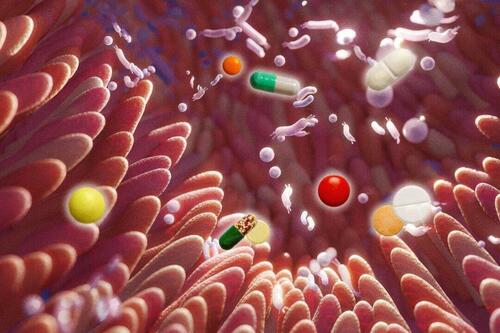Gut Changes Persist Years After Stopping Certain Medications
Authored by Rachel Ann T. Melegrito via The Epoch Times (emphasis ours),
The body clears medicines within hours to weeks. However, a recent study suggests that drugs you took years ago may continue to affect your gut—and the more frequently and the longer they’re used, the greater their effect.
 Troyan/Shutterstock
Troyan/ShutterstockNearly nine out of 10 commonly used medications leave permanent changes in gut bacteria - including drugs never before linked to digestive effects, according to the study.
This holds true not only for antibiotics but also for drugs used to manage high blood pressure, anxiety, and stomach hyperacidity.
“We may be underestimating the impact of common medications on gut health,” Kara Siedman, nutritionist and director of partnerships with resbiotic Nutrition, who wasn’t involved in the research, told The Epoch Times.
Your Gut RemembersThe findings extend far beyond antibiotics, which doctors already know disrupt gut bacteria. The study showed that even medications targeting human cells—including antidepressants, beta-blockers, acid reflux medicines such as omeprazole, benzodiazepines, and metformin—reshaped the gut microbial composition.
“We often think of medications as acting only on human cells, but they also interact with the gut ecosystem—the microbes, the intestinal barrier, and the immune system,” said Siedman.
The study found that many drugs left lasting effects on the gut, still visible more than three years after people stopped taking them. To test whether the drugs themselves were responsible, the researchers tracked a smaller subgroup over time. In this group, starting a drug caused predictable gut shifts, and stopping it often reversed them, supporting a causal link.
Findings showed that common drugs had similar effects to antibiotics. Benzodiazepines, commonly prescribed for anxiety, changed the gut as much as certain broad-spectrum antibiotics by reducing microbial diversity. Antidepressants also left patterns similar to those seen with antibiotics.
Gut Microbes AffectedA common bacterial type that increases with drug exposure, such as antidepressants and beta-blockers, is the Clostridium family. Some of these bacterial species are linked to rare cases of infections in humans.
Benzodiazepines are linked to increases in Dorea formicigenerans and Ruminococcus torques. Dorea formicigenerans are linked with obesity and metabolic syndrome in some human studies, though it can also produce beneficial metabolites. Ruminococcus torques is a bacterium that breaks down the mucus in the gut lining and is linked to gut conditions such as Crohn’s disease, irritable bowel syndrome, and metabolic disorders when present in abundance.
Drugs used for the same condition didn’t always affect the gut in the same way. For instance, within benzodiazepines, alprazolam (Xanax) led to a greater loss of gut microbial diversity than diazepam (Valium).
Proton pump inhibitors are linked to increased levels of oral bacteria such as Streptococcus parasanguinis and Veillonella parvula, both linked to periodontal disease and dental cavities.
Perhaps most striking was the cumulative nature of these changes. People with a history of antibiotic use never fully regained the same gut diversity as those who had never taken them, regardless of how long ago their last course was prescribed.
Past use added up: higher doses and longer durations left stronger, longer-lasting shifts in the microbiome. This additive pattern was seen with benzodiazepines, steroids, and beta-blockers.
How Drugs Affect the Gut MicrobiomeThere are several mechanisms by which medications might affect gut bacteria.
Drugs can slow or stop the growth of some gut bacteria while letting others thrive, shifting the microbiome’s balance. Some directly kill or suppress beneficial microbes, while others alter stomach acid, influence immune responses, or weaken the gut lining.
Antidepressants can disrupt how gut bacteria make and use energy, sometimes killing them directly. Nonsteroidal anti-inflammatory drugs can irritate the gut lining, making it leakier and more inflamed, which changes which microbes can thrive.
Beneficial microbes make short-chain fatty acids that help calm inflammation. Elimination of these microbes can lead to gut inflammation and breakdown of the gut barrier as short-chain fatty acid levels drop.
Gut inflammation and breakdown of the gut barrier can contribute to metabolic problems such as fatty liver, insulin resistance, and possibly higher cardiovascular risk.
Microbes can bounce back after stopping a drug, especially if the gut was diverse to begin with or if the diet supports regrowth. Although some may vanish completely if wiped out and not replenished.
A 2024 review noted that recovery isn’t always complete. Even when diversity returns, the mix of bacteria can stay changed for months because some species never come back or are replaced.
Babies are highly vulnerable to gut microbial changes.
A 2022 study found that infants who were given proton pump inhibitors (PPIs) for more than 400 days had a less diverse, less balanced gut microbiome—and these changes persisted even after one month of stopping the medication. The researchers concluded that longer PPI use may disrupt the microbiome more than shorter courses.
Early-life exposure to antibiotics is also linked to increased risks of metabolic and atopic disorders, as well as higher risks of allergies, asthma, and metabolic diseases later in life.
Recovery Is PersonalWhile drugs affect the gut in predictable ways, the extent varies widely.
“Diet is the strongest driver of microbiome health and resilience. What we eat shapes microbial diversity, fiber fermentation, and bile acid production, all of which interact with drugs,” Siedman said.
A high-fiber diet helps restore balance after antibiotic use, while a low-fiber diet can weaken the gut barrier and fuel inflammation, slowing microbiome recovery. Gut inflammation can also change how quickly drugs are absorbed, and shifts in bile acids can alter how fat-soluble drugs are processed.
A person’s baseline microbiome composition is another key factor. “Two people can take the same medication and see very different microbiome shifts and recovery times depending on how diverse or robust their gut community was to begin with,” Siedman added.
How to Protect Your GutFor patients who require ongoing medication, Siedman suggested practical ways to build resilience and support the gut ecosystem:
* * * Click Pic, Buy Filter, Enjoy free shipping, Live longer * * *
Loading recommendations...
